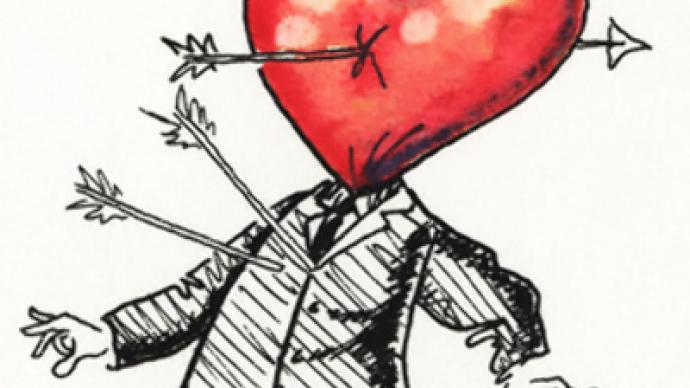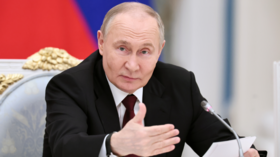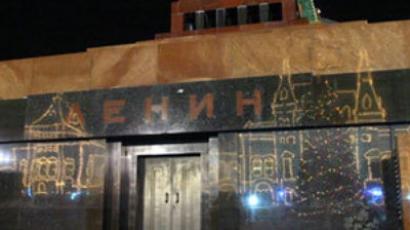Coz I luv you

Aleksandr Lukashenko confesses he cannot live (at least politically) without close relations with Russia, while Vladimir Putin fancies the two countries’ leaderships might be in love with each other.
Two meaningful statements were made almost simultaneously by the Belarusian leader Aleksandr Lukashenko and Russian Prime Minister Vladimir Putin regarding the bilateral relations of the countries.
At a meeting with the delegation from the Volga Federal District, the President of Belarus claimed that “departing from the policy of rapprochement with Russia would mean political death for Lukashenko.” He also challenged the “rumors” of Belarus changing its geopolitical orientation westward, saying that “for one Russia’s step towards Belarus we would make ten steps towards Russia in return. We want our elder brother – Russia – to treat us as a younger brother. They might scold us, but never abandon, never offend, never bend us down and never reproach us as if we were a ball and chain on Russia’s legs,” claimed the politician.
Almost simultaneously, Russian Prime Minister Vladimir Putin, who was conducting a live TV phone-in, answered the question about his attitude to Lukashenko’s recent attack on him, which took place during the Belarusian leader’s press-conference with the Russian regional media.
“Maybe this is love, isn’t it?” replied the head of the Russian government. “Talking seriously, we have very kind, warm feelings towards all the Belarusian people and the country itself… The year before the last, we gave Belarus a $1.5 billion loan, a $1 billion loan last year, and a $5 billion loan this year. Surely, the Belarusian leadership would like to get more. It is possible, but only as part of the integration process in the framework of the Union State. The deeper this integration, the more opportunities will come up.”
This exchange of opinions came during another stage of the intercommunication that only a hopeless optimist would call mutually fond. It was also Lukashenko’s second pro-Russian public statement in less that a month.
What is that – a late attempt to catch the departing train of integration with Russia, or just another maneuver inside the Minsk “multi-vector” policy? Or maybe both?
It is worth noting that the Belarusian leadership has recently been discouraged, by Europe itself, from staking on its “European strategy”. In November, the EU Council prolonged the suspension of diplomatic sanctions against Belarus, but did not remove them, as many in Minsk had expected. The economic sanctions were not removed either.
PACE, OSCE ODIHR and other institutions, as well as international NGOs have not changed their skeptical view of the political and human rights situation in Belarus. And even Silvio Berlusconi’s visit to Minsk was taken during the transition period in EU, before the Lisbon Treaty came into effect. New EU Foreign Minister Catherine Ashton has already set the record straight, saying on December 2 that EU attitudes and approaches towards Belarus haven’t changed and are not likely to change in future unless the Belarusian leadership undergoes the process of democratization.
Aleksandr Lukashenko has already made a couple of steps to fit the criteria of democratization. The biggest one is the Belarusian Parliament adopting liberal amendments to the country’s Electoral Code. The amendments are being criticized by the opposition (as half-hearted) and confidentially by Belarusian “siloviki” [security and intelligence chiefs – ed.] (as too liberal and fraught with unpleasant surprises during the oncoming elections). It is becoming obvious that all liberalization attempts, especially during a time of economic crisis, might undermine Lukashenko’s own positions within Belarus. That makes the westward geopolitical journey senseless for him and gives every reason for reactivating Belarus-Russia integration. To prove his good intentions, Lukashenko behaved himself at the EurAsEC summit in Minsk and signed the Customs Union Treaty, despite all the criticism cast at it by some Belarusian experts. Now the question is: will Russia trust the Belarusian leader this time and go for it?
The answer has been clearly specified by Vladimir Putin, who said that the work of the Customs Union is to become an important tool for overcoming the crisis and reviving economic growth, and called it the real way for further integration. So the Customs Union of three might open up a promising perspective for the Union State of two. The Union State of Belarus and Russia has recently been becoming less and less functional as the parties have been unable to resolve their differences over a number of questions. The creation of a regional, free economic zone (which was defined as the next step after the common customs territory is set up) with one more participant is the thing that could be really helpful at a time when economic problems have moved to the forefront. However, what is integration without supranational authorities? The three countries – Russia, Belarus and Kazakhstan will have to create governing bodies along the model of the EU. But that would require much more love.
Darya Sologub for RT












